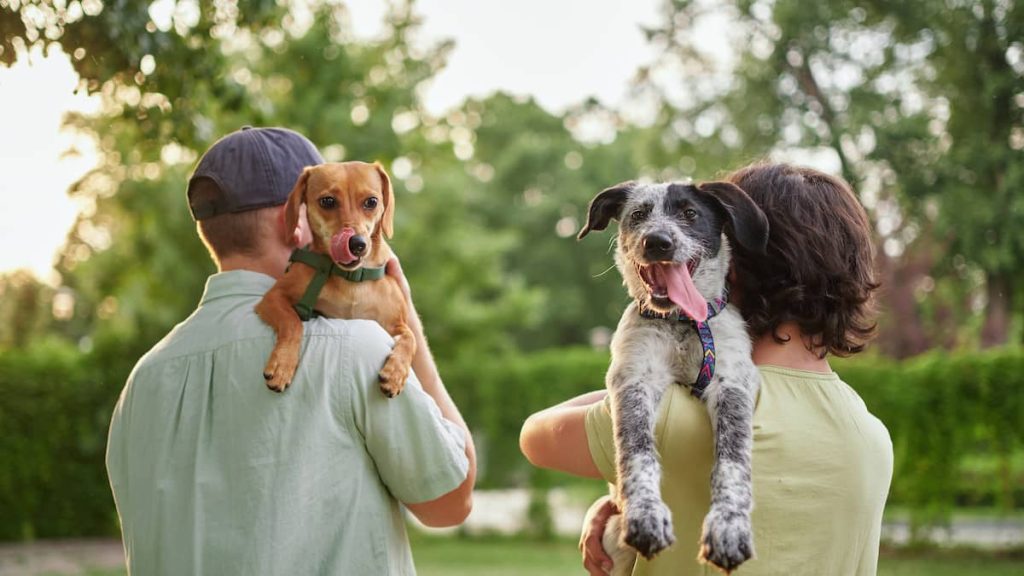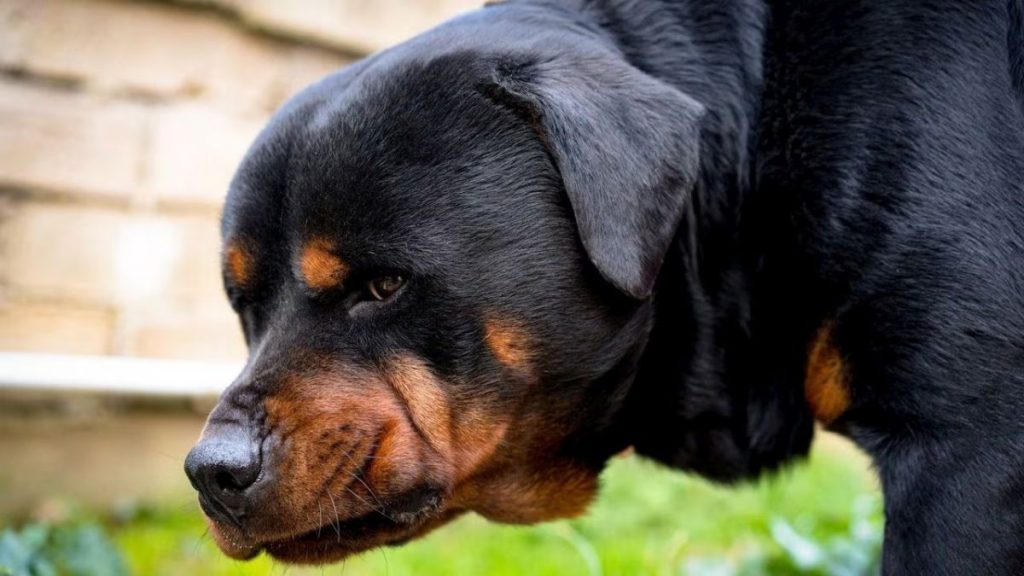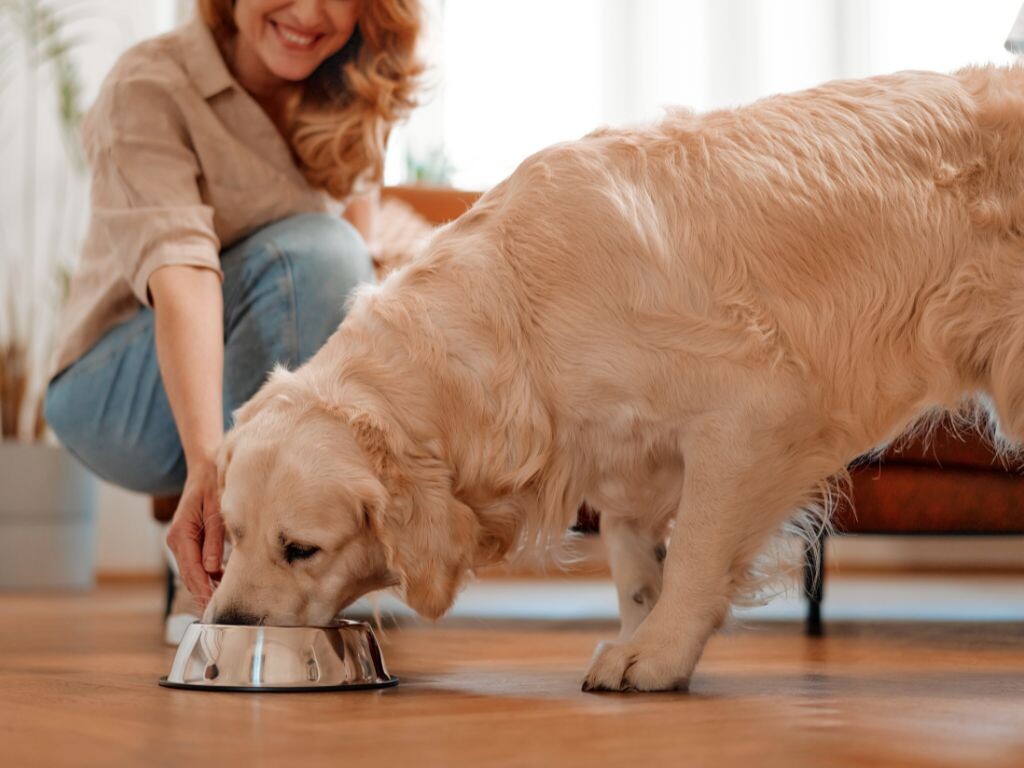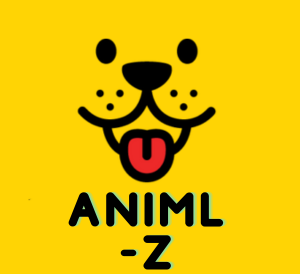
Your dog leaves food in his bowl and this upsets you? This may be a simple loss of appetite without consequences or a sign of a more serious problem. Understanding the reasons for your change in behavior regarding your meals is necessary to avoid any unnecessary worry, but also to take care of a health problem.
Find out what could be the causes when your dog sulks at its bowl.
Behavioral causes
Dogs, just like us, have their food preferences, and these may vary throughout their life. Some animals may get tired of their food, while others, on the contrary, will refuse any change.
Furthermore, boredom or lack of stimulation, just like a drop in morale, can make the animal less inclined to finish its bowl. A dog can absolutely be anxious, feel sad, or even be grieving or depressed and lose the desire to eat. Be aware that a dog can be very sensitive to its environment and what is happening to its family members. Likewise, a stressed or noisy environment can influence the dog's appetite.
It can also be a higher source of interest which attracts the animal's attention and distracts it from its bowl. So, if a more palatable treat is close to him, if a child is playing nearby and your furball gets along very well with it, he may simply judge his bowl less interesting than the stimulus which distracts him from it.
Environmental factors
Some dogs may be more sensitive than others to temperature changesinside the house and that they are affected in terms of their metabolism. This then affects their appetite. So, when it's too hot, they eat less than when temperatures are more comfortable.
Likewise, in the event of moving, the arrival of a new member in the family, whether a human or an animal, travel, change of environment can disturb the doggie and affect his eating behavior. Some animals will need to eat more while others, on the contrary, will turn away from their meal.
Finally, it happens that dogs fed self-service, benefiting from a bowl that is always full, or, on the contrary, undergoing irregular meal times, no longer feel the urgency or the desire to eat at specific times. Indeed, in the wild, canines experience hunting periods followed by meals, then fasting phases between each meal. This cycle creates a natural rhythm of hunger and satiety. When food is always available, the dog no longer always feels this instinctive need to eat immediately, which can lead to disinterested behavior. Likewise, irregular meals disrupt this cycle.
Food quality
The food may either be damaged or, quite simply, have been changed and become less palatable.
Although most dogs are much less picky than cats, some are gourmet enough to refuse a spoiled or oxidized ration. Indeed, food such as pâté, BARF or household ration left for too long at room temperature quickly loses its qualities and can even become dangerous. With his keen sense of smell, your dog may refuse it, and that's a good thing. Avoid leaving wet food in the bowl for more than 30 minutes. Concerning kibbles, they can oxidize. If they have been left in the open air for too long or you have closed the package incorrectly, the contact of the fats with oxygen makes them toxic. Some dogs sense it and shy away from them. Others eat them anyway, but it risks causing diarrhea or vomiting.
To note : The kibble begins to oxidize from the first opening of the package, even if you close it tightly. This is why it is advisable not to take too large volumes. The ideal is that the package does not exceed one month, although larger bags cost less. If you still want to buy large quantities, place the kibble in a vacuum and only keep the equivalent of one month without vacuum.
Besides the alteration, the change of kibble or recipes may disturb your dog. If the new composition is less palatable or simply less to his liking, your pet may turn away from it in order to make you understand that he wants to return to the previous menu. This is often the case with specific food for kidney or liver failure. To avoid too much resistance from your companion, proceed gradually, going through a period of dietary transition. It is not only useful to your body, but also to your taste. You can possibly add palatable products (with agreement from your veterinarian). It can be a little cheese (if allowed) or salmon oil, meat juice…
A health problem
Various health problems can cause a lack of appetite. Moreover, anorexia is a biological response which allows the animal to devote more energy to fighting an illness.
First of all, you should check his mouth: if your dog has oral or dental problems, he will have difficulty chewing. Gum disease or even decay can make eating painful and deter the pet from eating.
He may also suffer from digestive problems. Thus, it associates the meal with abdominal pain which will make it difficult to eat. Intestinal parasites, gastritis or intestinal obstruction are enemies of the appetite and in the latter case, there is an emergency!
Certain chronic illnesses also affect appetite. This is the case, for example, of kidney or liver failure.
A change in eating habits therefore deserves visit to the veterinarian to check all blood parameters and check the mouth and digestive system.
Finally, it happens that certain medications make the animal nauseous or suppress its appetite. Some can even alter the taste, which leads to changes in behavior in front of the bowl. It is important to report this to your veterinarian so that he can change the molecule when possible or support your animal to manage the side effects of his treatment.
Aging
Over time, some dogs, like some humans, may lose the desire to eat. This may be linked to the reduction in their physical activity, because their energy expenditure decreases and their appetite responds accordingly. This is rather a good thing, because it prevents them from gaining weight which is sometimes associated with age.
It could also be due to metabolic changes that occur in his body: the digestive system, for example, becomes less efficient, hormones no longer function in the same way as when he was young, his sense of taste and smell may diminish and his teeth are less robust. All this contributes to a less marked interest in the bowl.
In addition, a dog that gets older sometimes encounters cognitive problems similar to dementia in humans, which affects their eating behavior.
How to react to your dog's loss of appetite?
Faced with a dog who does not finish his bowl several times in a row, it is appropriate to make an appointment with your veterinarian. If it lasts 24 hours and your doggie seems in good shape, don't panic, but beyond that, ask for a consultation, and even before the 24 hours have passed if he shows signs of depression, fever or fatigue .
Always check that your dog is drinkingotherwise, there is an emergency, because he may suffer from dehydration.
In any case, it is wise to vary your diet to avoid fatiguebut also to accustom your dog to change, which will prevent him from sulking if you one day need to adapt his bowl to new health or living conditions.
Be regular in meal times, the dog needs routines and security. Meals at a fixed time reassure him and stimulate his appetite, because he is prepared well before being served. He must eat in a calm and stable environment, without stimuli that could distract him.
Finally, Adapt portion sizes to age, weight and activity level of your canine companion. Also offer him varied textures to stimulate him. Croquettes, pâtés, which will also allow him to be well hydrated. Under the supervision of your veterinarian, add some palatable foods like a little parmesan, for example, or non-fatty meat juice, especially if your dog is picky by nature.
If your dog is getting older or has dental problems, increase the rations of mash, as they are less difficult to chew. It is also possible to lightly heat food to intensify the flavors and smells, making it more appetizing.
Finally, encourage your pet if he seems to have difficulty eating; it will be easier for him if he feels accompanied, especially when he is sick or elderly.
A dog who does not finish his bowl can therefore have very different reasons, benign or serious. This ranges from behavioral disorders, changes in the environment to pathology, including age or the quality of one's food. It is therefore important to have the cause checked by the veterinarian before implementing a strategy.




